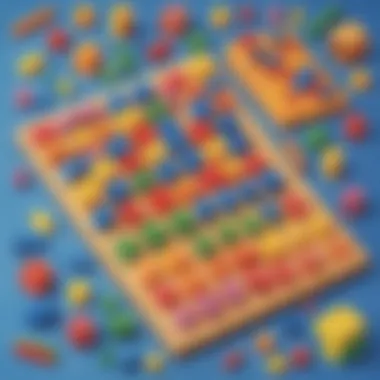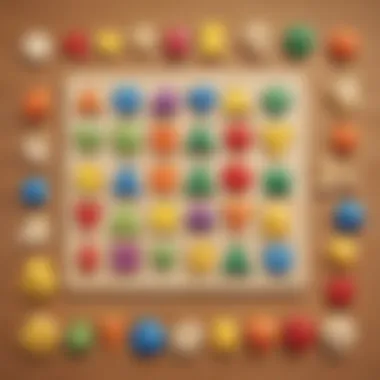Engaging Math Activities for VPK Students to Foster Critical Thinking


Science Fun Facts
Discover the Wonders of Math
In this section, we delve into various engaging math activities tailored specifically for VPK students. From basic concepts such as counting and number recognition to more advanced topics like simple addition and subtraction, these activities cater to the developmental needs of young learners. Through interactive tools, educational videos, and real-life applications of math, children can explore the beauty and relevance of mathematics in their daily lives.
Math Quiz Time
To test their knowledge and reinforce their learning, VPK students can engage in interactive math quizzes. These quizzes include multiple-choice questions, brain teasers, and puzzles that challenge children to apply their mathematical skills in a fun and engaging way. By gamifying the learning experience, students can develop a deeper understanding of mathematical concepts while honing their problem-solving abilities.
Math Experiment Showcase
Engaging in hands-on math experiments can further enhance VPK students' grasp of mathematical concepts. From measuring and sorting objects to creating patterns and shapes, these experiments provide a practical and visually stimulating way for children to explore the world of math. By following step-by-step instructions, referencing materials lists, and adhering to safety tips, young learners can conduct experiments safely while having fun and gaining valuable mathematical insights.
Introduction to Math Activities
In the vast landscape of early childhood education, the significance of introducing math activities to VPK (Voluntary Prekindergarten) students is profound. Math lays the foundation for critical thinking, problem-solving, and analytical skills crucial for cognitive development. By engaging young minds in mathematical concepts early on, we stimulate not only their numerical acumen but also ignite a passion for learning. The incorporation of math activities into the VPK curriculum is not merely about numbers, shapes, or equations but about nurturing young intellects and fostering a lifelong love for learning.
When delving into the realm of math activities, we encounter a plethora of benefits awaiting young learners. These activities serve as the bedrock upon which future mathematical understanding and proficiency stand. Counting, number recognition, and basic arithmetic skills transcend numerical knowledge; they instill logical reasoning, spatial awareness, and precision in young minds. By engaging in shape recognition, geometry exploration, and measurement exercises, VPK students hone their visual-spatial skills and develop an understanding of mathematical principles within their immediate surroundings.
Moreover, Introduction to Math activities offers a unique opportunity for children to grapple with abstract concepts in a tangible and practical way. Through interactive experiences and hands-on learning, students not only grasp mathematical concepts but also internalize them, making learning more meaningful and enduring. These foundational experiences pave the way for advanced math learning, nurturing a growth mindset and resilience in the face of challenging problems.
Counting and Number Recognition


Counting Objects
When engaging in Counting Objects activities, VPK students embark on a tactile and visual journey of exploring numerical values through physical objects. This hands-on approach not only makes learning enjoyable but also stimulates spatial awareness and fine motor skills. Counting objects such as blocks, toys, or fruits not only sharpens numerical skills but also cultivates a deeper understanding of tangible quantities. Through these activities, children develop a keen sense of number association with real-world items, laying the groundwork for abstract mathematical concepts.
Number Identification Games
Number Identification Games present a playful yet enriching way for VPK students to sharpen their numeral recognition skills. By integrating fun and interactive games, children subconsciously immerse themselves in the world of numbers, enhancing their proficiency in identifying numerals both in and out of sequence. These games not only boost memory retention but also foster logical thinking and problem-solving abilities. Through activities like number bingo, numeral puzzles, or digit matching games, students not only solidify their grasp on numerals but also cultivate a love for numbers and mathematical challenges.
Basic Arithmetic Skills
Basic arithmetic skills serve as the fundamental building blocks for mathematical proficiency in young learners. In this section, we delve into the importance of honing these foundational skills for VPK students. Understanding basic arithmetic is essential for students to grasp more complex mathematical concepts as they progress through their educational journey. By focusing on addition, subtraction, multiplication, and division at an early stage, children develop numeracy skills that are crucial for everyday problem-solving. The ability to perform mental calculations swiftly and accurately is a significant benefit of mastering basic arithmetic skills. This section will highlight the significance of these skills in nurturing a solid mathematical foundation for young minds.
Addition Activities
The exploration of addition activities plays a vital role in reinforcing the concept of combining quantities in young learners. Through engaging and interactive tasks, students can enhance their understanding of addition as a foundational arithmetic operation. Addition activities not only strengthen computational skills but also promote critical thinking and problem-solving abilities. By introducing manipulatives such as counting beads or blocks, students can visually comprehend the process of addition, making learning more concrete and enjoyable. Encouraging students to practice addition through real-life scenarios fosters practical application and reinforces the relevance of this arithmetic operation in everyday life. Through a variety of addition activities, VPK students can develop a strong numerical sense and build a solid foundation for more complex mathematical concepts.
Subtraction Exercises
Subtraction exercises are essential in developing the concept of taking away or finding the difference between two quantities. In this section, we delve into the significance of subtraction as a foundational arithmetic skill for young learners. Subtraction exercises not only reinforce students' computational abilities but also enhance logical reasoning and critical thinking skills. By engaging in subtraction activities, students learn to identify patterns, understand number relationships, and strengthen their problem-solving skills. Introducing subtraction exercises through interactive games and real-world examples makes the learning process not only educational but also enjoyable. Through consistent practice and exposure to subtraction exercises, VPK students can master this arithmetic operation and apply it to various situations, preparing them for more advanced mathematical challenges.
Shape Recognition and Geometry
Identifying Shapes


Identifying Shapes is a fundamental skill that forms the cornerstone of geometric understanding. Encouraging VPK students to identify various shapes such as circles, squares, triangles, and rectangles not only sharpens their visual acuity but also introduces them to the building blocks of more complex geometric concepts. Through hands-on activities like sorting different shapes, matching shapes to real-life objects, and exploring the characteristics of each shape, young learners develop a solid foundation in geometry. This section will explore creative and engaging ways to help VPK students master shape identification, ensuring they grasp the intricacies of different geometric figures with ease and confidence.
Exploring Symmetry
As students progress in their mathematical learning journey, understanding symmetry becomes increasingly important. Exploring Symmetry not only fosters an appreciation for balance and order but also hones children's cognitive abilities. By engaging in activities where they identify symmetrical and asymmetrical shapes, draw mirror images, and recognize patterns of symmetry in everyday objects, VPK students can enhance their spatial reasoning skills. Understanding symmetry is not only vital for geometry but also lays the groundwork for comprehending mathematical concepts in higher grades. This section will delve into the significance of symmetry in mathematics and offer engaging activities to help VPK students grasp this fundamental geometric principle.
Measurement and Comparisons
When engaging VPK students in Length Measurement Exercises, it is vital to employ interactive and hands-on activities that allow children to explore and comprehend the concept of length. Encourage students to measure different objects using non-standard units like paper clips or building blocks. By comparing the lengths of various objects, students learn to differentiate between short and long items. These exercises not only enhance mathematical skills but also develop critical thinking and problem-solving abilities in young learners.
Conversely, Comparing Sizes and Quantities involves activities that prompt students to evaluate and contrast the sizes of objects as well as the quantities they represent. By engaging in size comparison exercises, such as sorting objects from smallest to largest, students develop visual discrimination skills. Additionally, activities that involve comparing quantities, like identifying which group has more or less items, help students grasp basic numerical concepts. These comparisons contribute to the development of observational skills and quantitative reasoning in VPK students, paving the way for a deeper understanding of mathematical principles.
Pattern Recognition and Sequencing
Pattern recognition and sequencing play a crucial role in the development of mathematical skills for VPK (Voluntary Prekindergarten) students. Understanding patterns helps young learners identify relationships between numbers, shapes, and quantities, which is essential for future mathematical comprehension. By recognizing and creating patterns, children enhance their logical reasoning and problem-solving abilities, laying a strong foundation for more advanced math concepts. Moreover, sequencing activities aid in teaching children how to follow a set order or pattern, improving their organizational skills and ability to predict outcomes. Through pattern recognition and sequencing, VPK students not only strengthen their mathematical abilities but also cultivate critical thinking and cognitive development.
Creating Patterns
Creating patterns is a fun and engaging way for VPK students to explore mathematical concepts. This activity allows children to experiment with shapes, colors, and numbers, fostering creativity and logical thinking. By arranging objects in a specific sequence or order, students can observe how patterns are formed and predict the next element in the sequence. This process not only sharpens their observational skills but also encourages them to think analytically and methodically. Introducing various pattern types such as AB, ABC, or geometric patterns can challenge children to think critically and apply problem-solving strategies. Creating patterns not only enhances mathematical skills but also promotes artistic expression and spatial awareness among VPK learners.
Sequencing Activities
Sequencing activities are imperative in helping VPK students understand the concept of order and continuity. By engaging in sequencing tasks, children learn to arrange events, numbers, or objects in a logical progression. This activity helps them develop fine motor skills, improve attention to detail, and enhance their comprehension of timelines and sequences. Sequencing activities can involve arranging story cards in the correct order, organizing events from a story, or placing numbers in ascending or descending order. Such exercises not only reinforce mathematical concepts like counting and sorting but also contribute to the overall cognitive development of VPK students. Through sequencing activities, children develop essential skills that are fundamental to their academic growth and future success in mathematics.


Critical Thinking and Problem-Solving
Critical thinking encompasses the ability to objectively analyze information, discern patterns, identify connections, and draw sound conclusions. Within the world of mathematics, critical thinking sharpens the mind to navigate complex problems, extrapolate knowledge from different concepts, and synthesize information effectively. Furthermore, problem-solving skills empower students to tackle challenging mathematical puzzles with confidence, enabling them to approach problems methodically and derive solutions through logical reasoning.
Interactive Math Games and Tools
In this section, we delve into the essential topic of Interactive Math Games and Tools, exploring their pivotal role in the holistic development of VPK students. Interactive Math Games and Tools play a crucial part in engaging young learners with mathematical concepts through hands-on activities and digital resources. By incorporating Interactive Math Games and Tools into the educational framework, students can explore mathematical principles in a dynamic and interactive manner, fostering a deeper understanding of key mathematical concepts. These games and tools not only make learning enjoyable but also aid in reinforcing fundamental skills such as numeracy, problem-solving, and critical thinking.
Furthermore, Interactive Math Games and Tools offer a personalized learning experience, catering to different learning styles and paces. They provide a platform for students to practice and apply mathematical concepts in a fun and stimulating environment. Additionally, these tools enable educators to track students' progress, identify areas of improvement, and tailor learning activities to meet individual needs. By incorporating Interactive Math Games and Tools into the VPK curriculum, educators can enhance student engagement, motivation, and overall mathematical proficiency.
Online Math Games
Online Math Games offer a virtual platform for VPK students to interact with mathematical concepts in an immersive and engaging way. These games not only reinforce key arithmetic and problem-solving skills but also introduce students to technology in an educational context. Through Online Math Games, students can explore a variety of mathematical concepts, solve puzzles, and engage in interactive challenges that promote critical thinking and cognitive development. Moreover, these games provide immediate feedback, allowing students to monitor their progress and challenge themselves to achieve mastery in different mathematical areas.
Online Math Games also promote collaboration and competition among students, fostering a sense of camaraderie and peer learning. By participating in online math challenges, students can enhance their communication skills, teamwork, and strategic thinking. Furthermore, these games can be customized to align with the VPK curriculum, ensuring that students practice relevant mathematical skills in a stimulating and interactive way. Overall, Online Math Games offer a dynamic approach to math education, blending technology with traditional learning methods to create a comprehensive and engaging learning experience.
Math Manipulatives and Resources
Math Manipulatives and Resources are tangible tools that provide VPK students with hands-on experiences to explore mathematical concepts. From counting blocks to geometric shapes, these manipulatives offer a multisensory approach to learning, allowing students to visualize and manipulate abstract mathematical ideas. By engaging with math manipulatives, students can develop spatial awareness, fine motor skills, and conceptual understanding in a concrete and practical manner.
Moreover, Math Manipulatives and Resources cater to students with diverse learning needs, providing a tactile and visual representation of mathematical concepts. These resources enable students to experiment, hypothesize, and problem-solve through interactive activities that spark curiosity and creativity. Additionally, math manipulatives promote active learning and peer collaboration, encouraging students to communicate their reasoning and strategies when tackling math problems.
Incorporating Math Manipulatives and Resources into the VPK curriculum enhances students' mathematical proficiency, critical thinking skills, and conceptual comprehension. By offering a hands-on approach to learning, educators can create a stimulating and inclusive mathematical environment that supports various learning styles and abilities. Overall, Math Manipulatives and Resources serve as invaluable tools in the educational arsenal, empowering VPK students to explore and master mathematical concepts through kinesthetic and visual experiences.
Conclusion
The importance of the Conclusion within this article lies in its ability to reinforce the educational value of the math activities presented. It serves as a reflection point, allowing young learners, parents, and caregivers to absorb and contemplate the mathematical skills and critical thinking processes they have engaged with. By encapsulating the main takeaways and learnings in a concise manner, the Conclusion aids in solidifying the educational journey embarked upon by the VPK students, paving the way for enhanced retention and application of mathematical concepts.
Furthermore, the Conclusion acts as a bridge between the theoretical knowledge and practical application of math skills. It encourages young learners to apply the concepts learned through the activities in real-world scenarios, fostering a deeper understanding of mathematical principles and their relevance in everyday life. Additionally, for parents and caregivers, the Conclusion serves as a valuable reference point for monitoring the progress and development of their children in math education, offering insights into areas of strength and areas that may require further reinforcement.







